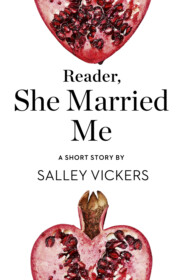По всем вопросам обращайтесь на: info@litportal.ru
(©) 2003-2024.
✖
The Other Side of You
Настройки чтения
Размер шрифта
Высота строк
Поля
‘I missed the Heath.’
None of this told me more than that she was still unwilling to let me into the circumstances of her concealed catastrophe. And, indeed, I had no right to any inroad into it. Besides, there’s a rhythm to all nature, including human nature, and like a good naturalist a prudent analyst knows how to wait.
‘How long were you and Neil together before you married?’
‘A few months? I can’t remember.’
‘He doesn’t seem to have left much impression on your memory.’
‘Neil was all right. It was me that was wrong.’
‘In what way “wrong”?’ I tried to keep the note of curiosity out of my voice but by now I longed to know.
It had grown too dark to see her distinctly and, reluctantly, as I try to avoid artificial light as long as possible, I switched on the bronze lamp, in the figure of Hermes, which I had on the table by my chair.
I’m fond of this lamp. I bought it in Paris when I once took Bar Buirski there, while she was still Bar Blake.
Outside, I made out the shape of the ginger tom poised on the fence and beside him, in weird juxtaposition, I could see a reflection of my lamp and my patient in the blue armchair, the few feet between us expanded into an unnavigable mirage of air.
At that moment she began to speak, and, as she did so, the cat dropped down to merge with her image in the glass in an action so swift I almost jumped up in protest. It was as if a bird was being targeted with that intent feline spring. I can still see the orange shape leaping into the reflection of Elizabeth Cruikshank, as I can hear her near inaudible words.
‘I was faithless.’
‘Can you say more?’
‘Another time. It’s not possible now.’
8 (#ulink_ca7c18de-e238-5b2b-9b9d-d28bda8fe8b4)
GUS RANG ME THAT EVENING WHILE OLIVIA WAS BESIDE ME in her dressing gown, her toes, like twin neat rows of glossy rubies, resting on my mother’s embroidered footstool. She’d asked my help in varnishing her nails. I sometimes think my mother was right and I’d have made a better career as a surgeon: I’ve a remarkably steady hand.
When I spoke of work in front of Olivia I was always conscious of a slight awkwardness, and there were times, more than made me quite comfortable, when I wished I could leave the room, or ask her to leave. I conducted the conversation with Gus in the shorthand I’d developed for such occasions.
‘I’ve been thinking,’ I said, ‘I’ll do that thing for you.’
‘Great stuff.’ I could tell he was delighted. ‘Got someone up your sleeve?’
‘Exactly how long have I got?’
‘The back end of May. No need for any earth-shattering stuff. Just your natural sweetness and light will do.’
‘Thanks a million. I’ll be crucified by Jeffries & Co. if I go on about “sweetness and light”.’
‘Better men than you have been crucified. I’ll be at your side to fend off the baboons if the bloody medics let me.’
A patient who might have fitted Gus’s purpose for the conference paper was a young Pakistani student studying maths and physics at Sussex University. He’d been found wandering in the early hours on a trunk road outside Brighton. The police patrol that had picked him up reported him ‘disoriented and apparently praying’. He was brought into St Kit’s where a diagnosis of schizophrenia had finally been applied.
Pages of a notebook covered with seemingly bizarre thoughts and disconnected prose, and an inability to name the current British prime minister, had formed the basis of this diagnosis. Later, when the confused young man had been formally admitted, and I was present at his case conference, I pointed out that precious few of us, in a state of distress, would be able to name the prime minister of Pakistan and that the seemingly deranged sentences in the boy’s notebooks were attempts at formal logic. As a result of this intervention he was given over to my care.
He was agitated, desperately homesick, distraught, but not, I concluded, psychotic. I took him off the Modecate injections and tried to restore some sort of equilibrium. They don’t say so in the textbooks but a lot can be effected through patience and calm. Maguire and I were in agreement that if this commodity were available on the NHS there would be far fewer admissions to psychiatric hospitals.
I’m not sure why there is something shaming about having no one to confide in but in my view a good deal of aberrant behaviour stems from unbearable isolation and the socially unacceptable sense of being quite alone. Hassid, I concluded, was suffering not so much a nervous as a social breakdown. Away from his close-knit Karachi family, his religion, his customary diet (food plays a much larger part in emotional stability than is usually acknowledged) and the regular ritual practices he had been raised in, he had lost his bearings.
I can’t pretend to have liked all my patients but those I did like tended to be the ones I found I was able to help most. I could never decide if it was gratitude at having some positive effect on their lives that made me like them, or if liking makes some significant therapeutic difference. In any case, I liked Hassid, I understood that he was lonely, but his character also caught my curiosity and I established his trust through an indistinct memory, that grew to a clear recollection, which enabled me to identify the repeated appearance of ‘iff’ in his notebooks, not as some schizophrenic misspelling, as had been supposed, but the correct logical term for ‘if and only if’. As a result of this lucky strike he confided to me the sad account of what had occurred.
He had gone, nervously, on account of the new and strange environment, to a student party where towards the end of an already confusing evening he’d been slipped a tidy slug of vodka in his soft drink. The unaccustomed alcohol, together with the discovery of what he had innocently imbibed—I gather the idiot who performed this gross act was crass enough also to brag about it—combined to destabilise the poor young man’s mind. His family, he told me, were strict Muslims, and the shame and guilt, along with the physical effects of the alcohol, precipitated a mental crisis. The university suddenly seemed to him a place of evil and satanic darkness, from which he felt an understandable need to flee; which is why the police patrol picked him up shoeless, beating his head and reciting, to them incomprehensible, verses from the Koran.
In those days doctors had more licence. Hassid was patently terrified of returning to his student quarters. I decided the best I could do for him was to keep him with us for a spell. I judged that what he needed most was rest in sympathetic surroundings while he found his feet.
But also there was something in it for me. I enjoyed our sessions together because I discovered that what Hassid wanted, once he had recovered his centre of gravity, was to talk about his passion.
It is a feature of our profession that you are exposed to others’ interests and concerns. Thus, in the course of my duties, I have learned something of seamanship, sheep breeding, tax inspection (and tax avoidance), domestic science, the Petrarchan sonnet, horticulture, dentistry, astrology, astronomy, bell-ringing and the rudiments of how to fly a helicopter.
Hassid’s ruling passion, I discovered, was quantum mechanics. He was mad for Schrödinger’s cat, he idolised Dirac, he worshipped Niels Bohr. What intrigued me most, so far as my limited scientific intelligence was able to comprehend it, was Hassid’s account of their account of the nature of reality.
The structure of existence, which he attempted to convey to me—though often his words flowed by too fast for me properly to grasp them—was a thrilling and disturbing one, a tentative world of ambiguous possibilities rather than things or facts. Electrons, he explained, existed as a sort of misty potential, occupying no physical space in the material world but summoned into being only when a human measurement was made to determine their location.
‘You see, Doctor,’ Hassid said, ‘it is not that electrons are here waiting, like invisible germs to be discovered under the microscope—’
‘Or black swans waiting to be discovered in Australia?’ I interjected in an effort to show I was following.
But Hassid politely dismissed this. ‘Not swans, no, Doctor, not even black ones, because, you see, this is not a question of induction. Electrons are not, in the sense we mean it generally, here at all.’ His expression became sage.
I’ve always thought it remarkable that, while our bodies stand in the visible world, we ourselves are not in the world of three dimensions and our inner life has no position in space. And, equally, how little of another person’s reality is visible to us. We see their form, their features, their shifts of expression but all that constitutes their sense of self remains unseen. And yet this invisible self is what to the individual constitutes their real identity. I wondered, as I limped behind his explanations, if Hassid’s electrons were somewhat similar.
‘It is like a thought before one performs an action. The electron is no place and then’—he waved his elegant hand like a graceful conjuror—‘presto! Suddenly it is here, coming into existence out of seeming nothingness—but it is we’—excitedly he gestured at his chest—‘who bring it out. By what we do to it, you see, we give its state reality.’ His face glowed with intense pleasure at the arcane mystery he was initiating me into.
It wasn’t so surprising, I reflected after one of Hassid’s ‘seminars’, that he’d been mistaken for psychotic. The reality he described had its mad element. For one thing, it seemed to place human understanding at a central place in the universe. But then, great wits are oft to madness near allied. He was an engaging boy. And I warmed to him. But I worried that my feeble scientific understanding was insufficient to aid his adjustment to the ordinary world.
The day after Elizabeth Cruikshank had uttered those cryptic words to me I called by Maguire’s office and found her chatting to Hassid over the library trolley.
‘What’s going on here?’
‘Hassid’s helping us out.’ Making people useful was one of Maguire’s rehabilitation principles.
‘Sister wants me to look after the book trolley, you see, Doctor.’
The greater part of the library collection was the dud end of the old county library supply. Other books had been donated, or left behind, by patients or their visitors. Most of these were crime novels and thrillers, there were a predictable number of romantic novels and blockbusters, some out-of-date travel books, an old restaurant guide and a few uninspiring-looking classics. Wondering who would nowadays read The Swiss Family Robinson, I picked out a tatty copy of Pride and Prejudice.
‘Here you are, Hassid. This is a piece of Englishness which I guarantee won’t corrupt you.’
Hassid looked eager and remembering his tendency to bestow on any light-hearted remark of mine the status of a logical truth, I put the book back. ‘Don’t worry, it’s not doctor’s orders!’
‘Bet you wish it was, though, don’t you, Dr McBride?’ Maguire was aware of my partiality for Jane Austen.
Hassid changed the subject. ‘Doctor, Lennie has asked me to go with him to the match on Saturday.’
‘Lennie the cleaner?’











